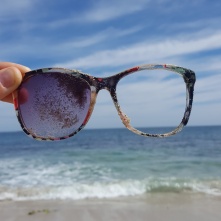I was recently in Bali, one of the most beautiful places on Earth. Just before we were due go on my trip I read an article about how 20,000 people had come together across the island to clean it up, #oneislandonevoice, on 24th February 2018. It was a fantastic initiative, but as I went past one of the enormous mountains of landfill a month later, I wondered where all the ‘rubbish’ that had been collected that day ended up. With so much of the plastic having no commercial value I had fears that landfill was the only option. And then it becomes inevitable that plastics end up in our waterways and oceans.
Plastics have been in the news a lot lately. Every day on social media sites there are images of dead seabirds or other sea mammals with their digestive tracts full of plastic leaving them to a slow and painful death. We see photographs of massive plastic islands in all our main oceans, some of these are estimated to be the size of large countries. And then we have the microplastics, less visible, plastics less that 5mm in length, which have even been found in the more remote regions of our oceans.
The first fully synthetic plastic, Bakelite, was invented in the early 1900s. Mass production of plastics made from crude oil, began in the 1940s and 1950s. Only a hundred years later in 2050, we could have more plastic in the ocean than fish. Back in Bali, there was plastic bags, cups, straws and bottles scattered along the tide line as I walked along the beach close to our accommodation, while snorkeling, plastic bags danced in the water jellyfish-like, plastic rubbish was caught in foliage by the side of the roads and plastic floated in the waterways.
Bali is just an example of what is happening in so many places around the world. It is perhaps more shocking in such a beautiful place. But will an initiative to set up by volunteers be enough to begin the education of the Balinese, or will it take a government initiative? Where I live in Western Australia, our state government is about to introduce a ban on lightweight plastic bags on July 1st 2018. While shopping bags make up only a small proportion of plastic waste they can have a devastating impact on marine life and birds. Let’s hope this new law will be the first of many. There is already talk of a ban on plastic straws.
As I walk on the beach with my dog each day I know that our use of plastics and how we dispose of them has to change and that change can’t come soon enough. The amount of plastic I pick up depends on weather and tides, however there is some plastic there every single day.
July 1st is also the beginning of Plastic Free July, a movement started in 2011 by the Earth Carers in Perth, Australia. Plastic Free July is now an independent not-for-profit Foundation. It aims to raise awareness of the problems with single-use disposable plastic and challenges people to do something about it. Millions of people from 159 countries world-wide take the challenge and raise awareness and try to make a difference.





Moving in fairly like-minded circles, it’s easy to feel as if we’re all rolling up our sleeves and trying to make effective change. Then you sit on a bus with someone who thoughtlessly discards a plastic food wrapper, or pass a fast-food outlet and see its overflowing bins, and realise there’s still an awful long way to go. But at least some steps are being taken. We’ll just have to hope it’s not too little, too late.
LikeLiked by 1 person
So true. I fear it is too late. We as so called, developed and educated countries should have seen this coming.
LikeLiked by 1 person
I love that you are sharing all of this. It’s terrifying but so important.
What in the world do you do with all that plastic you personally pick up. I have no idea how to dispose of it!! I’d like to do at least some small thing about this!
My dear friend Karuna has some great ides on her blog.
https://livinglearningandlettinggo.com/2017/02/01/repurposing-waste-plastic/
LikeLiked by 1 person
I know. That is the problem. I feel at least it isn’t in the ocean … but then where. We just need to stop using it!
I’ll check out the blog too. Thanks
LikeLike
It is such an immense problem and even when we try, plastic is so often unavoidable. Here in South Africa for years now plastic bags in grocery stores have to be purchased and that has raised some awareness and more people use reusable shopping bags. Recycling though excellent has its limitations. There is more talk of banning plastic straws and reducing single use packaging. Better too late than never seems the best spin to put on it and cleanup campaigns definitely have their place too … . Thanks for highlighting this critical issue.
LikeLiked by 1 person
Thanks for joining in the conversation 😊
LikeLiked by 1 person
some good moves, finally, here in Australia. I remember seeing Dhaka before and after the plastic bag ban, and well, amazing positive difference!
LikeLiked by 1 person
Yes. We can live in hope.
LikeLike